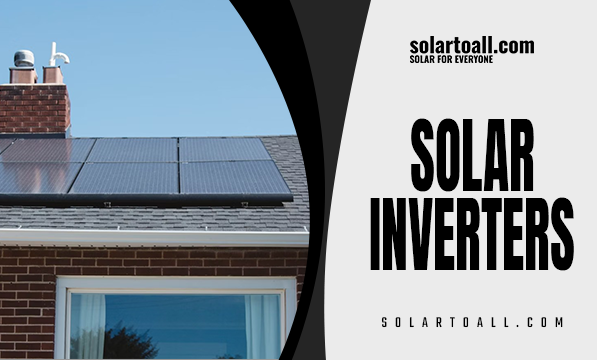
String vs Micro vs Hybrid: Which Type of Solar Inverters Suits You Best?
Explore different type of solar inverters with Solar To All. Learn which inverter suits your needs best for efficient solar performance and savings.
SOLAR INVERTERS
Solar To All
6/2/20254 min read
As solar energy becomes increasingly popular among homeowners and businesses, choosing the right solar inverter is a decision you can’t afford to overlook. While solar panels may be the most visible part of your solar power system, it’s the inverter that does the heavy lifting. A solar inverter converts the direct current (DC) generated by your solar panels into alternating current (AC) that powers your home or feeds back into the grid. This process makes the inverter a critical component in any solar setup.
But with multiple types of inverters on the market — including string inverters, microinverters, and hybrid inverters — how do you decide which one is best for your needs? Each type comes with unique advantages and limitations, and the right choice often depends on your specific energy goals, budget, roof design, and future scalability. In this blog, we’ll break down the key differences between Type of Solar Inverters, i.e. string, micro, and hybrid inverters. We’ll also explore how each performs in real-world conditions, what kind of maintenance they require, and which setups are best suited for each type. By the end, you’ll have a clearer understanding of what inverter technology best suits your solar ambitions.


String Inverters: Traditional & Cost-Effective
What is a String Inverter?
A string inverter by the Best solar companies is the most commonly used inverter in residential and commercial solar installations. In this setup, multiple solar panels are connected in a “string” and then linked to a single inverter.
Pros of String Inverters
Cost-Effective: Typically, the most affordable option.
Simplicity: Easy to install and maintain due to centralised design.
Proven Technology: Has been around for decades and is well-understood in the industry.
Cons of String Inverters
Performance Bottlenecks: If one panel in the string underperforms (due to shading, dirt, or damage), it affects the entire string’s output.
Limited Monitoring: Most string inverters offer limited panel-level monitoring.
Design Limitations: Ideal for roofs with a single orientation and minimal shading.
Best For:
String solar inverters are best suited for installations with consistent sunlight and uniform panel orientation, such as open rooftops or commercial settings with minimal shading.
Microinverters: Precision & Panel-Level Performance
What is a Microinverter?
A microinverter is a small inverter installed directly on each solar panel. Instead of converting electricity from multiple panels at once, each panel has its inverter that works independently.
Pros of Microinverters
Maximised Output: Since each panel works independently, shading or damage to one panel doesn't impact the others.
Panel-Level Monitoring: Provides real-time performance data for each panel.
Flexible Design: Ideal for complex rooftops with multiple angles or shading.
Cons of Microinverters
Higher Cost: Typically more expensive than string inverters due to more components.
Complex Maintenance: Requires accessing the roof to service or replace an individual microinverter.
Installation Time: Takes longer to install because each panel requires its unit.
Best For:
Microinverters are great for homes with multiple roof angles, partial shading, or when panel-level monitoring and optimisation are top priorities, as per the best solar design recommendations.
Hybrid Inverters: Smart & Battery-Ready
What is a Hybrid Inverter?
A hybrid Type of Solar Inverters combines a traditional solar inverter with a battery inverter in one device. It allows you to not only convert solar energy into usable AC power but also store excess energy in batteries for later use.
Pros of Hybrid Inverters
Battery Integration: Built-in support for energy storage systems like lithium-ion batteries.
Grid Independence: Lets you store excess solar power for night-time use or during blackouts.
Smart Management: Many hybrid systems come with intelligent energy management features.
Cons of Hybrid Inverters
Higher Initial Investment: Costs more upfront due to advanced capabilities.
Complex Setup: Requires more planning, especially if integrating batteries.
Limited Retrofit Flexibility: Might not be the best option for upgrading existing solar systems.
Best For:
Hybrid home solar inverter is ideal for users interested in energy storage, backup power, or aiming for greater energy independence and sustainability.


Key Considerations Before Choosing
Roof Complexity & Shading: If your roof has trees, chimneys, or multiple orientations, microinverters or hybrids will yield better efficiency.
Budget: If you are on a tight budget and have a simple roof, string inverters are a practical choice.
Future Expansion: If you plan to add panels or a battery later, a hybrid inverter may offer more long-term flexibility.
Monitoring Preferences: For tech-savvy users who want detailed analytics, microinverters or smart hybrid systems are ideal.
Final Thoughts
Choosing between a string inverter, microinverter, or hybrid Type of Solar Inverters ultimately comes down to your property layout, energy goals, and budget. While string inverters offer a reliable, cost-effective solution, microinverters provide granular performance control and efficiency for complex rooftops. Hybrid inverters, on the other hand, bring the power of storage and smart energy management into your hands, perfect for those aiming for energy independence and future-proofing their homes.
No matter which type you choose, the quality of the inverter and the installation team will determine your system’s performance and longevity. That’s why it’s important to go with a trusted solar partner. If you're still unsure which inverter suits you best, visit Solar To All. We offer expert guidance and a wide range of inverter solutions tailored to your unique energy needs. Get the most out of your solar investment, backed by professionals who understand the power of choice.
Solartoall.com
At Solar to All, a top solar panel company, we provide personalized solar design recommendations based on your electricity bill. Explore the latest solar technologies and connect with reputable local solar companies to make your transition to renewable energy seamless.
Contact details
solartoall.com@gmail.com
00918089018840
© 2025. All rights reserved.
